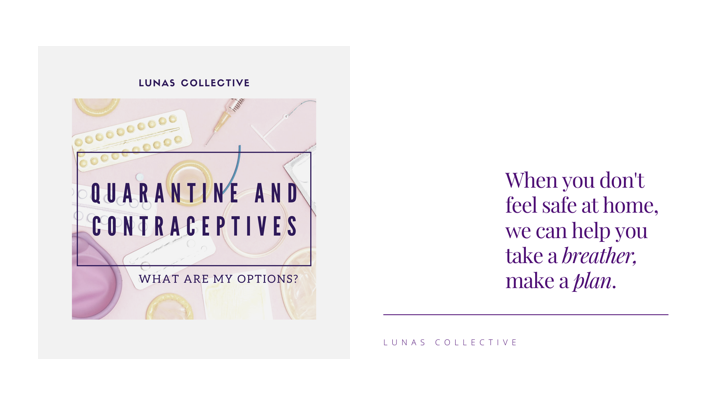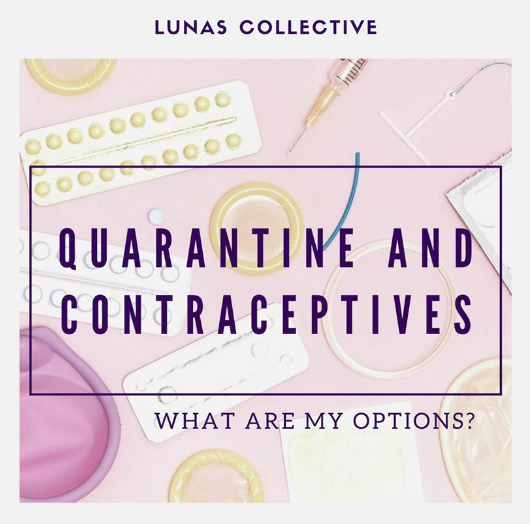Lunas Collective: Keeping the distance that COVID-19 social distancing removes between abuser, abused
The outbreak of the novel coronavirus disease (COVID-19) saw the world shut down, driving the world into quarantine, which experts said was the most effective way to stop transmission of the virus that causes the disease.
But quarantine seemed to have reached a precipice where measures to separate people and restrict their movement have both kept people safe from the virus but brought women closer to their abusers at home.
As COVID-19 surged, so did cases of domestic violence worldwide.
Anti-abuse advocates and activists had feared the effect of quarantines and lockdowns on those who live with domestic violence. Locked down inside homes, women would find it difficult, if not impossible, to escape from their abusers and seek help.
The National Domestic Violence hotline in the United States receives 1,800 to 2,000 calls on a normal day but between March 18 and 22, more than 700 callers cited COVID-19 as a “condition of their experience,” according to an AP report on March 25.
It was also reported that domestic violence calls to reproductive health association Women Safe in France and to Spain’s national 016 helpline increased following the pandemic.
Article continues after this advertisementWomen’s Safety, an organization dealing with domestic and family violence in New South Wales, Australia, said that more than 40 percent of its workers observed a rise in number of clients, with over a third of cases directly linked to COVID-19, according to an Agence France Presse report quoted by INQUIRER.net on March 29.
Article continues after this advertisementAustralian Prime Minister Scott Morisson had said there was a 75 percent surge in Google search for help during the nation’s total shutdown of non-essential services.
The Commission on Human Rights of the Philippines, on the other hand, has asked the government to assist people with disabilities during the enhanced community quarantine. PWDs, especially women with disabilities, are at increased risk of gender-based violence during the quarantine.
Lunas Collective

LUNAS COLLECTIVE IS A FEMINIST, INCLUSIVE CHAT SERVICE FOR FILIPINOS SEEKING SUPPORT RELATED TO GENDER-BASED VIOLENCE AND REPRODUCTIVE HEALTH. Image: Facebook/Lunas Collective

LUNAS COLLECTIVE IS A FEMINIST, INCLUSIVE CHAT SERVICE FOR FILIPINOS SEEKING SUPPORT RELATED TO GENDER-BASED VIOLENCE AND REPRODUCTIVE HEALTH.Image: Facebook/Lunas Collective.
“What choices do people have in these times to keep themselves safe not just from the pandemic, but from violence in their own homes?” said Sabrina Gacad, assistant professor at the Department of Women and Development Studies in the University of the Philippines’ College of Social Work and Community Development. “What choices do people have in these times to keep themselves safe from pregnancies, if they did not intend to have them?”
These were the questions Gacad grappled with when she saw the increased reports of gender-based violence associated with lockdowns around the world.
“The implementation of community quarantines leave vulnerable peoples with very little choice. If the perpetrator is an intimate partner, family member or a member of their household or their shared housing facility, then homes are not safe,” Gacad told INQUIRER.net. “If it is deemed unsafe to leave homes to visit health providers for contraceptives, then, assuming there is consent, even sex gets risky. It becomes a kind of psychological lockdown — [it] keeps people in various stages of worry, fear, and panic.”
This led Gacad to set up Lunas Collective, a feminist, inclusive chat service that runs on the compassion of volunteers — a safe online space where people seeking support related to gender-based violence and reproductive health can expect to be heard.
“To reduce the worry, the shame, and the fear experienced by survivors of violence and people with an emerging need for reproductive health advice, we need to be here, for them, ready to listen when they want to talk,” said Gacad. “We want to give them a sense of comfort, a sense of relief. From there, we start helping them make a plan — what do they need? How can we help them get what they need?”
Listening is the first step at Lunas.
Once clients are ready to take the next step, they are given options like referral to counselling and reproductive health specialists, said Gacad.
The collective also provides clients contact information for authorities who are mandated to remove perpetrators or abusers from their homes.
“Always, we will be listening, and then we will be giving options, and correct information about these options,” she said.
“Ultimately, we want our clients to know, we see them, and we support their choices,” she said. “In this simple way, we hope we are able to give them a sense of relief and help them find their sense of control and power.”
The collective is currently in its pilot phase, having started only last March 29.
Right now, Gacad said the collective is testing its processes, like handling inquiries, referring clients and finding other ways to give support, as well as studying if it is a service Filipinos would need.
Volunteers or “vollies” of Lunas Collective undergo training to ensure they are ready for the work at hand.
They attend orientation sessions about the project’s design and objectives, given primers on feminist principles and care, sexual and reproductive health and Sexual Orientation and Gender Identity and Expression and Sex Characteristics (SOGIESC). When it comes to gender-based violence, Gacad said responders are trained and have experience in pyschological first aid.
Volunteers are tasked with different responsibilities, some in operating the chat service and talking to clients, others in organizing the collective’s Facebook page and seeking people online who might need help.
“We also have vollies managing the processes and protocols, so we can run operations smoothly, even given our ad hoc nature,” she added. “Everyone takes initiative.”
Forms of violence
Gender-based violence in the Philippines is more commonly known as violence against women, said Gacad, adding that violence is not only physical but also refers to any kind of harm inflicted on a person.
These forms of violence can be physical or verbal, which includes threats and actual physical harm; sexual, such as rejected sexual advances or sexual advances without consent; emotional or psychological like deception, manipulation, shaming, and gas lighting; financial by deprivation of financial support; and social by way of isolation.
“Social deprivation can be like preventing a person’s mobility or movement,” Gacad said.
Examples are prohibitions against going out alone or talking to friends and relatives. It could also take the form of phone confiscation “and simliar efforts that we see in reports about abusers using COVID-19 to stop their partners from leaving home,” said Gacad.
Challenges and limits
Lunas Collective has since partnered with Likhaan Center for Women’s Health in referring clients for reproductive health consultations, and the Psychological Association of the Philippines for training. It also has the staunch support of the University of the Philippines’ Center for Women’s and Gender Studies, and the Department of Women and Development Studies in its initiative.
But there are still some challenges that have to be faced, especially concerning emergency cases. Gacad recognizes the limitations of chat service, saying Lunas can only receive reports of violence, but has no power to intervene. And since the collective can only reach people on social media, how to reach more people who need its help remains a big question, she said.
So far, the collective is able to help by providing numbers at the Philippine National Police and local governments which those in distress could call.
She said the group is currently building a directory of authorities who could provide emergency assistance in domestic violence cases. In the pilot stage, Gacad said Lunas has “severely limited capability to respond to emergencies.”
The collective is addressing this by developing partnerships with local government units and reaching out to its own contacts in the development sector. It is also in the process of slowly creating a database of contact information of active gender desks at the village level, Gacad said.
“We’re into a few days of operation and our demand generation approach is data-driven,” Gacad said.
She said the group is tapping into data from the Demographic and Health Survey “to craft content and demand generation strategies.”
“We are also supported by our partners in the development sector and developing more partnerships,” she added.
Talking about violence, supporting survivors
Speaking up and seeking help may seem easier said than done for some survivors of gender-based violence. Some refuse to speak up about their abuse out of shame, others perhaps may be unaware that violence is wrong because it is common in their families and neighborhoods, or because they themselves have become used to it.
In the Philippines, gender-based violence and sexuality are issues that have yet to be discussed openly, said Gacad.
“We know all the tsimis, we know who’s involved, and possibly even why and how,” Gacad said. “What we haven’t gotten around to doing is talking about all this without pointing fault at the people who are on the receiving end of violence,” she said.
“We are not talking about it without judgement against survivors. In different segments of our society, we are not used to talking about how perpetrators of violence have to [be] stopped and reformed, we only say, ‘Ganun talaga, tiisin mo muna, lilipas din yan.’”
But this is not the way to go. Gacad said she believes people must keep talking about violence — and why it is wrong.
“Talk about how victims and survivors of violence never deserved it, they were never asking for it,” she said. “We should talk more about what liberating, caring love is, and why that is good for all of us. Once we do more of these, then the shame around gender-based violence will fade away.”
Even more, she proposed that people should check their privilege, refrain from passing judgment on survivors, and fight the unfair social norms that dictate what men are permitted to do and what women should do.
“To help survivors of gender based violence, to help ourselves and our communities, I think it’s also time we started asking if all these gendered expectations and scripts and norms make us feel good about ourselves,” she said. “Do these allow us to be truthful to the amazing human beings we think and feel we truly are? And if they don’t, it’s time to defy them.” WITH REPORTS FROM GABRIEL PABICO LALU
(For those in need of help against abuse at home or anywhere, here’s Lunas Collective’s online site: https://www.facebook.com/LunasCollective)
Edited by TSB
For more news about the novel coronavirus click here.
What you need to know about Coronavirus.
For more information on COVID-19, call the DOH Hotline: (02) 86517800 local 1149/1150.
The Inquirer Foundation supports our healthcare frontliners and is still accepting cash donations to be deposited at Banco de Oro (BDO) current account #007960018860 or donate through PayMaya using this link.